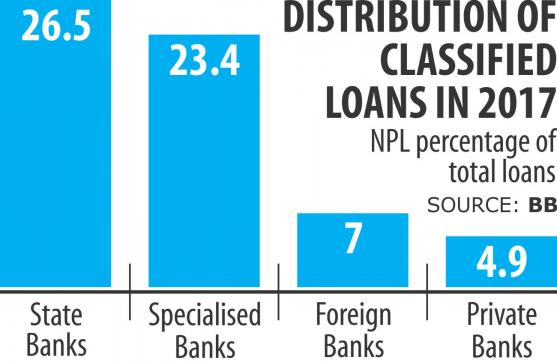State banks' escalating bad loans a threat: BB report

The rising default loans in the eight state banks, which accounts for 57.53 percent of the total classified loans in the banking sector, have become a threat to the sector's stability, according to the Bangladesh Bank's Financial Stability Report.
The presence of state-run banks in the top 10 list for non-performing loans may weaken the stability of the financial system as these banks play critical roles in financial intermediation, said the report, which was unveiled yesterday.
BB Deputy Governor Ahmed Jamal unveiled the report at the central bank headquarters in the capital while managing directors of all banks were present.
Inadequate due diligence in credit management is one of the major reasons behind the escalating NPLs in the eight state banks in recent years.
The NPL of the eight state banks -- Sonali, Janata, Agrani, Rupali, BASIC, Bangladesh Development, Bangladesh Krishi and Rajshahi Krishi Unnayan -- increased 16.46 percent to Tk 42,752 crore in 2017 from a year earlier.
The practice of loan rescheduling also went up heavily in the banking sector last year in line with the rising default loans, which created further stress on banks.
In 2017, the amount of rescheduled loans stood at Tk 19,120 crore, up 24 percent year-on-year. The rescheduled loans, however, had declined in 2016 from a year earlier.
“Poor due diligence, influenced lending, fraud and negligence in compliance of risk management practices could be the reasons for the rise in rescheduled loans,” it said.
Private banks accounted for a highest portion of the rescheduled loans: 53.1 percent of total such loans in the banking sector.
State-owned commercial banks, specialised banks and foreign commercial banks accounted for 41.9 percent, 4.1 percent and 0.9 percent respectively of the banking sector's aggregate rescheduled loans.
“The banking sector is said to be the main source of funds in accelerating economic growth through short-term financing. But the pile-up of rescheduled loans seems to be a matter of concern.”
Despite the expected rescheduling, a large amount of rescheduled loans in the industrial sector, particularly garment and textile, in conjunction with the lack of required follow-up may create downside risks for the banking system as a whole.
The stressed advance, which includes the NPLs and rescheduled loans, also increased to 19 percent last year from 17.2 percent a year earlier.
Large industries, which enjoyed 46.1 percent of the total loans given by the banking industry, accounted for 46.6 percent of the total stressed loans in the banking sector last year.
In 2017, the stressed loans in the large industries also increased significantly: by 12.8 percentage points from 2016.
The medium industries possessed 14.4 percent and small industries 11.7 percent of the total stressed loans in the banking sector.
The accumulation of larger stressed loans can hamper financial intermediation and banks' profitability.
“Therefore it is a foremost concern for the bank management and the regulator,” the report said.
The bank should boost recovery drives to ensure collection of dues and speedy resolution of stressed assets.
The banking sector also faced a provisioning shortfall of Tk 6,767 crore in the last year as the state-run banks were largely responsible for keeping the regulatory requirement, the report added.
